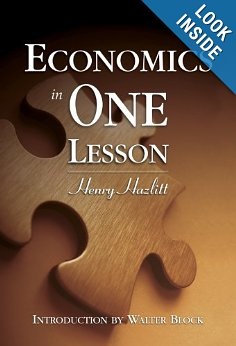Book Review: Economics in One Lesson: The Shortest & Surest Way to Understand Basic Economics6/1/2013  A Must Read for Politicians and Laymen Alike This is a very good and timely book. It’s a downright shame that it was written in 1946 and governments around the world have not heeded the simple lesson and practical applications advanced in this work. It’s divided into three sections: Part One: The Lesson With one chapter, “The Lesson” - in which he asserts: “The art of economics consists in looking not merely at the immediate but at the longer effects of any act or policy; it consists in tracing the consequences of that policy not merely for one group but for all groups.” (p. 17) Part Two: The Lesson Applied Here is the bulk of the book in which he goes into the particulars of applying that one simple lesson to various situations, including (but not limited to): public works programs, taxes, tarrifs, governments “rescuing” businesses, price-fixing, rent control, minimum wage laws, unions, profits, inflation, and saving. He ends the section with a restatement of the lesson and how if applied it would enable success on such a grander scale than what we’ve come to see in our own lifetimes since the government did not apply this lesson but did just the opposite. A few potent quotes to help you understand his view: “When they say that the way to economic salvation is to increase credit, it is just as if they said that the way to economic salvation is to increase debt: these are different names for the same thing seen from opposite sides. … When they say, under nearly all conditions, that the way to recovery is to increase wage rates, they have found only another way of saying that the way to recovery is to increase costs of production.” (p. 193) “But the solution is never to reduce supplies arbitrarily, to prevent further inventions or discoveries, or to support people for continuing to perform a service that has lost its value.” (p. 199) “And this is our lesson in its most generalized form. For many things that seem to be true when we concentrate on a single economic group are seen to be illusions when the interests of everyone, as consumer no less than as producer, are considered. Part Three: The Lesson After Thirty Years This is another one chapter “part” in which the author did the unfortunate task of detailing (though clearly not exhaustively) how our country (and others) have not paid attention to the soundness of this lesson and how we have since continued to suffer the consequences: “Governments everywhere are still trying to cure by public works the unemployment brought about by their own policies. … Governments still provide special encouragements to unprofitable industries. … They not only retain minimum wage laws but keep increasing their level, in face of the chronic unemployment they so clearly bring about.” (p. 208) In short, the more the government gets involved in the market economy, the worse the market economy does. While the book lends itself toward a depressing note toward the end, the author does leave the reader hopeful in the significant rise that: “Conservatives, libertarians, and other defenders of free enterprise are becoming more outspoken and more articulate.” (p. 211)
It’s my hope that many truly will read this great work (especially Christians), think through these concepts with clarity (especially the Christian obligation in influencing government to rule under the Lordship of Christ), and then be inspired to become such defenders of free enterprise (by proclaiming the gospel in all its fullness, including the role and responsibility of the government to stay out of the economic market place)! |
Categories
All
|